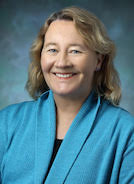Carol Greider
 |
Distinguished Professor of MCD Biology
B.A. University of California, Santa Barbara (Biology)
Ph.D. University of California, Berkeley (Molecular Biology)
Fellow, Cold Spring Harbor Laboratory
|
LAB HOMEPAGE
Telomeres are specialized structures at chromosome ends that protect the ends and distinguish them from broken DNA. DNA replication replication leads to telomere shortening at each round of cell division, but telomere length is maintained by the enzyme telomerase. Telomerase is specialized reverse transcriptase, containing essential protein and RNA components. A template within the essential RNA allows addition of telomere sequence repeats onto chromosome ends. Telomere length maintenance is critical because short telomeres lead to cellular senescence or permanent cell cycle arrest. Although many non-dividing human somatic cells do not express telomerase, human tumors turn on telomerase to allow continued growth. The Greider lab is focused on understanding the dynamic interaction between telomeres and telomerase that establishes the telomere length equilibrium. To understand the role of telomerase in mammals, we generated telomerase null mice that were viable and showed progressive telomere shortening over six generations of breeding. Our telomerase deficient mice recapitulate age-related degenerative disease in seen in families with inherited Telomere Syndromes. People with mutations in telomerase, or other telomere regulatory genes, have progressive telomere shortening that leads to bone marrow failure, pulmonary fibrosis and other diseases. Our lab studies both mammalian cells and yeast to understanding the fundamental biological mechanisms that underlie telomere length equilibrium to inform potential disease treatments. One major current focus is on exploring the relationship between DNA replication and telomere elongation.
Please follow this link to find the lab's publications in the National Library of Medicine's PubMed database.

